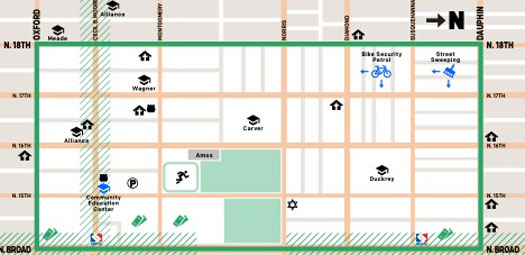
April 5, 2019; The Temple News
At NPQ, we have from time to time examined university efforts at community engagement and the relationships of universities and other place-based anchor institutions to community groups. A new such effort was launched last week, as Temple University in Philadelphia announced the formation of the North Central Special Services District, a nonprofit whose board comprises five community residents and four Temple employees, as Kelly Brennan and Will Bleier report in The Temple News, an independent student publication.
The creation of a special service district—a nonprofit that seeks to improve well-being in neighborhoods near the university—may seem a small matter, but as Brennan and Bleier explain, it’s not. “Temple has long struggled with its community relations,” they write.
Like other similar entities, such as the University City District, which has operated continuously in West Philadelphia since 1997, the new nonprofit aims to address “quality of life problems like trash, student behavior and other issues that have impacted the area.” Its mission statement identifies four primary areas: area beautification, mitigating student impact, promoting workforce development and educational opportunities, and public safety.
One design feature Brennan and Bleier identify as distinguishing this effort from past Temple attempts is the board’s composition, which gives community residents majority control. “It is designed to give community residents the majority voting power so they have control of what programs and initiatives are approved or rejected,” Brennan and Bleier emphasize. The board, they add, will meet each month with the lofty aim to “determine ways to deal with problems that others have not found solutions for in decades.”
Sign up for our free newsletters
Subscribe to NPQ's newsletters to have our top stories delivered directly to your inbox.
By signing up, you agree to our privacy policy and terms of use, and to receive messages from NPQ and our partners.
Still, the dependence on Temple is clear: the nonprofit’s executive director is Tara Miller, manager of Temple’s special projects. Right now, Miller is the special service district’s sole employee; she’ll report directly to the nine-member board but keep her current university role. First-year funding totaling $500,000 is also provided by Temple.
Board appointee Kenneth Turner straddles both the “university” and “community” constituencies; he’s a grounds maintenance worker at Temple and a lifelong North Philadelphia resident. Turner notes that in 2018 Temple had hoped to build a stadium in the area, and he’s not convinced the idea is fully off the table. As he puts it, “You gave a little something, you want something in return, right? The stadium isn’t over.”
For now, beautification and trash pickup seem to be the group’s highest priorities. According to Miller, the board’s first action is expected to be to enter into a contract with One Day At A Time for street sweeping and litter clean-up services. The group is a North Philadelphia nonprofit that helps employ people in recovery from drug and alcohol addiction.
“Some special services districts,” note Brennan and Bleier, “are taxing authorities, meaning they can levy taxes on businesses within the district to retain funding.” North Central district will operate on donations, like the University City District (UCD). UCD, however, has multiple funders, including the University of Pennsylvania, Drexel University, Lenfest Foundation, the University of Pennsylvania Health System, and a variety of civic associations and small businesses. UCD is also much larger, with 25 permanent staff members, a 27-member board, and a budget exceeding $10 million. Of course, the North Central effort is just getting started and may add new members and funders over time.
Joan Briley, one of the five community board members, is the board’s initial president. Briley says she’s optimistic about the group’s potential. “You would be amazed at what’s going on in this neighborhood, and we want to keep it alive,” Briley told Brennan and Bleier. She also made it clear that community members plan to stay in the driver’s seat for the long haul: “You can’t take over this neighborhood without a say from us.”—Steve Dubb












